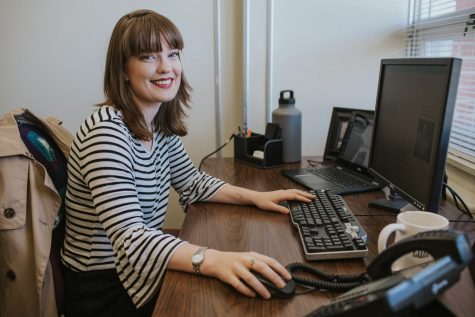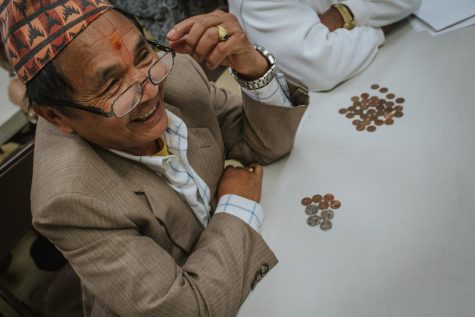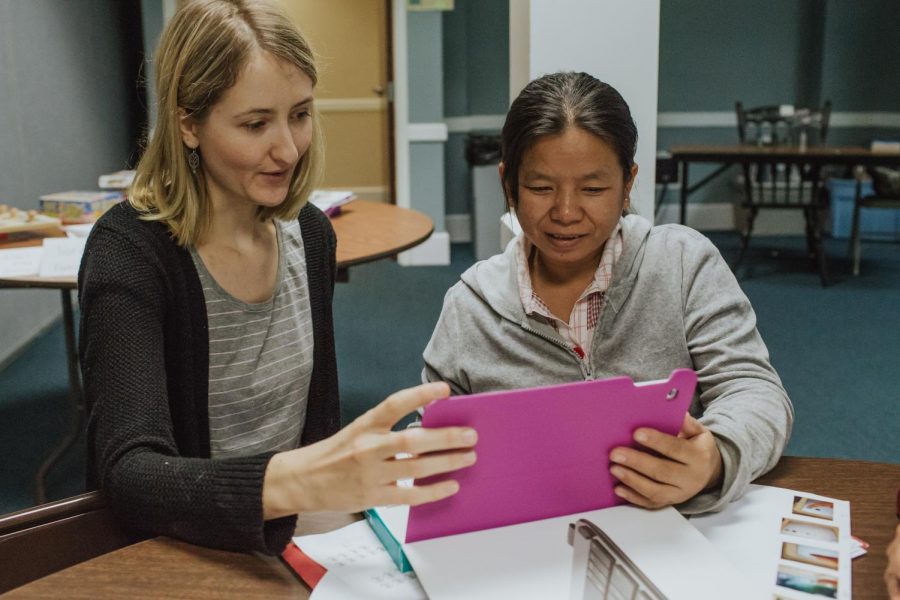Part II of II: World Relief’s mission to aid refugees (Helping provide refugees and immigrants with a new hope in a new world)
A refugee utilizes World Relief DuPage/Aurora’s English as a Second Language (ESL) class to help ease the difficulties of settling into a new culture.
September 5, 2018
In times of gross injustice and mass oppression of human rights, the most culpable sin one can be guilty of is silence. Complicity comes not only in the perpetration of heinous acts, but in the surrender of failing to raise one’s voice over egregious demonstrations of inhumanity.
Tabitha McDuffee is the Communications Coordinator of World Relief’s DuPage/Aurora office and believes in the empowering obligation of raising one’s voice.
“Social media provides us a quicker way for our elected representation to hear us. Social media is not a way to get around how our government works, but is rather a new way to get involved with the way our democracy functions,” she argued.
McDuffee credits the galvanizing role of social media with pressuring President Donald Trump to sign the executive order ending his family separation immigration policy. She believes we have an ethical and moral contract with ourselves, inspiring us to stand up for those who are most vulnerable and in need of aid.

This willingness to help the less fortunate is reflected in World Relief’s total 63,900 national volunteers (2015). Together, they stand up for the innocent across the word, swept in the turmoil of war, persecution, disaster, disease, hunger and poverty.
In America, World Relief is contracted by the U.S. State Department to resettle refugees. The World Relief DuPage/Aurora office has endeavored to welcome refugees and aid immigrants since opening in 1979.
Such ardent support amongst the local community has never been more vital, as the Trump administration announced its refugee admissions policy with increasingly difficult qualification standards.
McDuffee explained, “In the past, our office has resettled around 600-700 people per year. This year, the number will be significantly less than that, somewhere around 250-300 people.
“In previous years, the U.S. resettled upwards of 200,000 people. This year, we are on track to resettle only 10% of that number. President Trump set the cap at admitting 45,000 nationally (the lowest figure since the Refugee Act of 1980) this year, however, we are going to meet less than half of that number.
“World Relief would like to see an increase in the number of refugees resettled. We would like to see the caps that are set, actually met. We would also like to see the whole basis on the way immigrants come change, because with the backlogs and the wait times now, the system is unsustainable.”
World Relief DuPage/Aurora’s operation policy is to, “offer holistic services designed to promote local integration so that refugees and immigrants root and flourish in supportive communities.”
In a constantly changing political dynamic, World Relief DuPage/Aurora finds itself having to adapt to provide the best aid to both those abroad, and those living in the broader community.
McDuffee discussed dealing with the obstacles policies such as Trump’s travel ban creates. “A few of our refugees were in the process of coming, already approved overseas with their flights set, and then everything became delayed because of (Trump’s) ban.

“When the travel ban first happened, it was hastily written,” she said. “There were serious issues such as legal permanent residents coming back to the U.S. who were denied entry because they were from the list of banned countries. The policy had to be clarified that it did not refer to certain individuals. One of the things refugee resettlement organizations petitioned for was that people who had already been approved to come to the U.S. be allowed in. Eventually, the issue was worked out for most people in that situation.
“However, part of the issue with the travel ban, and it putting this 120 day pause on everything, was the expiration dates involved in background checks, medical checks, and every other step required for refugee resettlement. The expiration required these steps to be done again. After 120 days, we didn’t see a massive wave in new people to be settled because everybody had to go through the processes again. The new 3.0 travel ban, just upheld by the Supreme Court, has a list of seven countries with people who are denied the ability to come here. We are working with some people already settled here who are trying to reunite with family members still in the banned countries. They do not know when, or if, they will ever be reunited again,” said McDuffee.
Reuniting with loved ones who are trapped abroad can be an arduous challenge to navigate, however, World Relief specializes in ensuring the expediency of the process. Last year, World Relief helped reunite over 1,000 families across the nation.
McDuffee explained, “For refugees (already in the U.S.) there is a Follow to Join Petition. The petition is for when an individual or family is settled here, while there is still other family waiting abroad. Those waiting must also qualify as refugees.
“For example, one refugee at our office from the Democratic Republic of Congo met her husband while in a refugee camp. She had already started the process of resettlement before they got married. She and her son were approved to resettle, but he had not begun the process. She applied for a petition to have him accepted. It took around two years before he was approved to come.”
After arrival, a collaborative effort of donations and funding help foster success for the refugee.
“Donations at our local office level are raised at a local level. World Relief receives a combination of public and government funding, both federal and state, especially in regards to refugee resettlement. The funding comes from the Office of Refugee Resettlement, which is in the Department of Health and Human Services,” said McDuffee.
She continued, “There is a certain amount of money each refugee who is settled is given. It is meant to cover the first two or three months after arrival, until they can get on their feet and support themselves through employment. Here in our office, refugees have their first job on average of 60 days after they arrive.”
Finding employment for refugees takes commitment and determined outreach from the community. Local businesses are called upon to step-up and help those in need. Local businesses have come to depend on the tenacity and perseverance of refugee workers.
McDuffee explained, “Our office maintains relationships through our employment counselors with businesses in the area. A lot of them are manufacturing, packaging, or different types of companies. When we refer our refugees to them, the companies are very receptive because our clients have a very strong work ethic and they also are innovators.”
Along with finding employment, World Relief assures housing for the refugee.
“We arrange housing before the refugee arrives. We find them an apartment, sign a lease and pay for the first month’s rent. This is paid for by the money the refugee receives from the government. They receive somewhere around $1,200-1,300 per individual. A lot of the times, if it’s an individual, we have to find them a roommate,” explained McDuffee.
“The refugees are on a one-year specific refugee visa. At the end of one year, they apply for status adjustment, which leads to legal permanent status. This allows them to eventually get their green card. This is a given for all refugees who are settled,” she continued.
Often the most sensitive situation is helping refugee children settle into a foreign and intimidating new environment. Even though roughly 80-90% of those settled have friends or family in the region, they are still dependent on the help World Relief DuPage/Aurora provides to ensure their success in America.
“The biggest obstacle facing children is learning English. However, children tend to learn new languages faster than adults. Many of the local-area schools have a special English as a Second Language (ESL) track. Part of the time, children will be in regular classes, and they will also be in classes where all the students are new to learning English. Usually children remain on this learning track for one or two years,” explained McDuffee.
She continued, linking struggles the children separated under President Trump’s “zero-tolerance” policy face, with the services their office provides their children and adults. She explained how access to counseling and therapy is imperative for the children separated from their parents. World Relief DuPage/Aurora offers a center with licensed counselors. The counselors were all themselves immigrants and understand the difficulties that come with resettling. However, they also understand the opportunities that await each immigrant and refugee. They run individual sessions, and also run a seniors’ counseling group.
“For seniors, it can be especially hard to integrate into American culture. This leads to a lot of isolation. Our seniors come from a variety of cultures and come together to experience a bonding and ease into our society,” said McDuffee.
Through a familial relationship with their refugees, World Relief DuPage/Aurora provides an opportunity for a second chance. Even the most tested and tried of lives can receive their well-deserved redemption. The hardships and horrors of the past are never forgotten, but with an encouraging out-stretched hand, and a persistent voice of defiance, we can transcend the inevitable oppressions of fortune.
TO HELP OR VOLUNTEER
Tabitha McDuffee – “To help with refugees being resettled or immigrants seeking to reintegrate into our communities, there are many volunteer opportunities we have at our office and all other World Relief offices. We work with a lot of college students who do internships with us and receive school credit.
“What our volunteer coordinators like to say is, if there is a gift you have, a talent or a passion, we can find a way to use it to help refugees and immigrants. If people look at the list on our website of available volunteer opportunities and don’t see anything that jumps out to them, feel free to call us anyways and we can tailor-make a volunteer opportunity that you will love.”
Volunteering opportunities include:
*After school programs, such as tutoring and helping immigrant children with homework
*Aide for English-learning classes for adult refugees and immigrants
*Watching over children in the early-childhood program while parents are in their English language classes
*Clinics for people filling out their applications for citizenship (help make sure everything is filled out correctly)
*Preparing refugees to pass the citizenship exam
*Donating furniture to furbish refugee and immigrants’ new housing
*Volunteer for the transportation list (Helping refugees or immigrants without a car get around. For example, if a refugee needs a ride to a doctor’s appointment, an e-mail is sent to the transportation list, and whoever is available can choose to respond and help)
FOR MORE INFORMATION
*visit https://worldreliefdupageaurora.org/
*sign up for World Relief DuPage/Aurora’s newsletter
*Follow World Relief DuPage/Aurora on Instagram at https://www.instagram.com/wrdupageaurora/
*If you are interested in helping and learning about development in impoverished regions:
+The Savings for Life Program provides micro-financing to countries such as Cambodia and Rwanda, helping people manage their finances and grow their businesses. Micro-loans are provided via donations.
*If you are interested in helping and learning about immigration reform, you can help inspire World Relief’s strong advocacy for Deferred Action for Childhood Arrivals (DACA):
+Tabitha McDuffee – “World Relief would like to see a solution for DACA. People who were brought to the U.S. as children and have basically lived here for most of their lives need to be provided with an opportunity to earn a path to citizenship.”
——————————————————————————————————————-




















